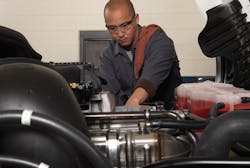LAS VEGAS. While a truckload carrier is a very different from a waste collection business, there are common concerns among all types of fleets when it comes to issues of maintenance and keeping trucks on the road. Finding and retaining skilled technicians, developing strong partnerships with parts and service suppliers, managing for total cost of ownership and above all minimizing truck downtime are top priorities no matter what the fleet type, according to a panel of maintenance directors at the Heavy Duty Aftermarket Dialogue.
With more than 5,000 tractors in refrigerated, flatbed and tanker service throughout the U.S. and Canada, Prime Inc. looks to do 80% of its maintenance in-house, said Paul Higgins, director of fleet maintenance. Staffing shops to handle that volume can be tough, he said.
Working with local high schools and vocational training schools helps Prime identify the best potential technicians, and then retain them once on board “by treating them well and allowing them to earn well if they’re productive.”
Working on a garbage truck is a lot different than working on an over-the-road tractor, and often less appealing to potential candidates for technician jobs, said Ron Svehia, senior manager of fleet maintenance for Republic Services, the country’s second largest refuse company.
“Guys aren’t beating down the doors to come work on our trucks,” he told the conference. Still working with local schools and then identifying a career path involving additional training once they come to Republic is the key to recruitment and retention, he said. “And the fact that the garbage business is steady and they can earn a good living for a long time helps as well.”
Ahern Rental’s main business is providing construction equipment, which it delivers to job sites in 30 states with its own fleet of 1,200 heavy- and medium-duty trucks. Although that’s a completely different business than either refuse hauling or truckload carriage, Ahern, too, struggles to find enough skilled technicians despite the overall high unemployment rate, according to Jon Cain, director of maintenance.
Technical schools are one source and in-house training helps, “but we struggle finding qualified people, and when we do, we try to keep them,” Cain said.
Another common theme for the three maintenance directors was that quality and availability trump initial cost when it comes to acquiring parts.
“We find both independent [parts dealers] and dealers give us great service,” said Higgins. “We can’t afford to let a truck sit down for three days waiting for a part. So if the service is there, we don’t change [vendors] over small price differences.”
For Republic, availability and ease of doing business, including electronic ordering, earn its parts trade, Svehla pointed out. And at Ahern being able to avoid warehousing parts because vendors can be counted on for availability is so important that “sometimes we’ll even change a part form what we might normally use or want because of availability,” said Cain.
Echoing the other panelists, Cain said: “A cheaper part can just buy you more work. We don’t look for the most expensive part, but we do look for the part that’s actually going to last.”
“We’ve seen time and again -- our total cost of ownership is not just the upfront price,” added Higgins. “It’s about keeping the truck on the road.”
About the Author
Jim Mele
Jim Mele is a former longtime editor-in-chief of FleetOwner. He joined the magazine in 1986 and served as chief editor from 1999 to 2017.
